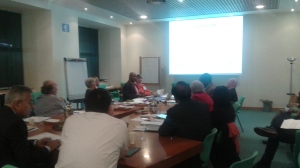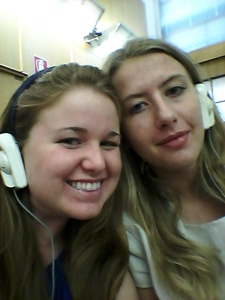I have been seeing Ebola all over Facebook lately, and what worries me is the reaction of my friends and family back in Texas. I have seen a lot of fear, angry, and even hate. So here is my stance on Ebola. You can choose to ignore me, or not. But I am surrounded by these cases at work and spend time on the crisis every day. I am not doctor, but I am educated and privy to the thoughts of veterinarians and other officials who have been to the actual crisis in Africa. So here is what I think you should know.
What happened to Thomas Duncan is tragic. A Liberian national, he met his girlfriend when they both fled to a refugee camp during the civil war. She became pregnant, but moved to America when she got a visa. Duncan’s brother and mother were also some of the lucky ones, but sadly he wasn’t. It took 19 years, his son is about to start college, but he finally got his visa. His girlfriend, who he had reconnected with over the last year, was ecstatic to see him and they planned to marry when he arrived.
Reports vary on how Duncan became infected. The only fact known is four days before his flight Duncan helped his landlord take his pregnant daughter to a hospital. Duncan’s brother said Duncan thought she was having a miscarriage; however it is known she died the next day of Ebola. He may have lied about being exposed to an Ebola victim when he got the airport or he may not have realized. That fact died with him. No matter what happened we should mourn the death of a man who just wanted the American Dream.
I have read comments on articles saying that Duncan was a terrorist in disguise, that he should never have been allowed in the US, and at the worse, that Africans somehow ‘deserved’ this, that Ebola is a cleanse, and or even that the severely infected should be ‘culled.’ In the internet, anonymous with their usernames, these people spread hate and encourage murder. These terrible words fill me with so much grief that anyone would be ok with the pain and suffering Ebola patients and their families and friends are going through.
What really hurts though are the comments I have heard from people back home. Smart and educated people, people who I know are good at heart. People who are upset about the deployment of American troops to build more treatment centers and to train local providers because they worried these soldiers will bring Ebola back home (US Troops to Give Help). People who think all flights should be canceled from West Africa and no nationals from the three most infected countries should be allowed on our shores. People who think West Africa should be isolated to prevent further spread.
Although the words are prettier, you are still condemning people to die.
Liberia, Sierra Leone, and Guinea are developing countries. They don’t have access to a population with a majority being well educated. They have struggled every day against other issues like malaria, starvation, political unrest, literacy, and countless others issues. But they have been winning. Over the last decade the conditions of these countries have been improving. Slowly yes, but still improving. They should be admired, how hard they have struggled and fought.
And now we have Ebola. These developing countries don’t have the infrastructure to deal with this disease. They do not have high tech hospitals with isolation wards and a plethora of doctors. Most of the time they don’t even have electricity. The capital of Liberia only has 15 ambulance teams for the entire city according to Times. I encourage you to watch this short video about Ambulance work in Liberia and a brave teams that risks infection every minute to save a few.
If there is any positive to be had from the Texas case is that it made America step up in its response to Ebola. Ebola has been out of control for months. The hospitals are overwhelmed and overcrowded. I really suggest watching this short video from 11 September. Times: Dying of Ebola at the Hospital. This was released over month ago. And this is still happening. All of my Texan friends and family. You don’t need to worry about Ebola. Unless you had direct contact with Thomas Duncan, YOU ARE FINE. Please calm down. Even if another infected person makes it to America, the CDC has upped its game. You will never see what is happening to Africans happen to Americans. We have the money and infrastructure to prevent anything like this happen. We should be worried about the infected countries neighbors, not the US (WHO: We must focus Ebola fight on 15 high-risk nations)
How did Ebola even get so bad? In its early stages Ebola is less contagious then the flu (which by the way kills 3,000 to 40,000 people in the US every year according to the CDC). However as the patient becomes more ill and starts to show some of the more severe symptoms. Vomit, diarrhea, blood, and other bodily fluids are the best way to spread this disease. And what makes Ebola truly dangerous is that even after a person dies the virus stays alive for quite a while. Ebola is most contagious right before/after death. The problem is, burial for Liberians is a very important culture affair. Family and/or friends will often wash the body and even kiss the forehead of a deceased person. The funeral of the first victim, a young boy bear the border of Guinea right where the three countries touch, is where the outbreak began. Those friends and family members, including a prominent healer, went home after the funeral unknowing carrying home a deadly virus. When they became ill their families carried for them not knowing they were signing their own death warrants. And slowly the disease spread. Keep in mind these people are poor. Many of them lacked a basic education. Coupled with a distrust of authorities breed from civil war, the government had no idea there was an outbreak until several months after the first case. By that time the disease had reached urban areas, where people lived close together, often in poor sanitation. Denial and Disconnect Add to Toll of Ebola in Sierra Leone. The slums have been the hardest hit. Many people still don’t believe Ebola is real, and refuse to tell people about sick relatives. And sometimes when people die and officials come to remove bodies there is protest and even violence. They are afraid, and don’t want to see their loved ones burned.
But guys, we can stop this! Senegal and Nigeria have contained their outbreaks and have been officially Declared Ebola Free. There is no reason this can’t happen in the rest of Africa! They just need help.
In the big picture there might be a few more cases of Ebola in the US before the outbreak is curbed, but from what I have been told if it does happen it will be rare and quickly contained. By the time a patient has become contagious (e.g. violent vomiting, severe diarrhea, and extreme fever) they would already be in hospital in the US. Due to the unpreparedness in the Texas case, the CDC is doing everything to become over prepared now. But you know, until the Outbreak in Africa is contained there will always be a risk for Ebola cases in other countries. Why? Because disease don’t respect borders or quarantines. They don’t resect soldiers with guns. Diseases want to infect, it is how they are successful as a species. Travel bands just make it near impossible for medical supplies and volunteers to arrive to these countries, exacerbating the issue. If this outbreak isn’t contained it could end up becoming endemic, like malaria. Instead of crying out in fear, let’s call out for aid and goodwill. These people are dying because unlike Americans their countries don’t have money to build and man good hospitals, where the symptoms can be treated.
I think Bob Geldof on Ebola summarizes it best. If you haven’t watched or read any of my other sources, please watch this one.
So please. You don’t have to worry about Ebola becoming out of control in Texas or the US. But you should be worried about the 10,000 people the WHO estimates could become infected PER WEEK in Africa (10,000 a week). You should be worried about them, their families, and their friends. The orphans that are left behind, the empty streets and bellies. Be smart, learn about what is going on (Ebola separating Fact from Fiction). Look around, there are plenty of charities that are sending people to help. Donate a few dollars and help build a bed for a sick child. Support our troops building hospitals. Anything. But please.
Don’t turn this African Pandemic into an American Panic.



